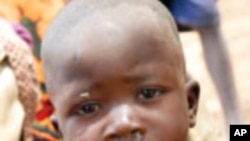Much of East Africa is withering from a long drought and it is affecting the lives of millions of people and animals. In northeast Uganda, for example, drought has worsened cattle raiding, fighting between clans and robbery.
In Uganda's Karamoja region, cattle raids are nothing new. In fact, they're more like a tradition. Groups of 50 or more men may raid a rival clan, stealing thousands of cattle. Some may get killed in the process.
But the lack of rain has made it even more dangerous as clans compete for water and pasture.
Abongi Patrick of the International Rescue Committee has seen the rains come and go.
"Early in the year, we had rain. People planted several crops, gardens. But then, from around March to date, we don't receive so much rain. So crops are destroyed," he says.
It's been a long time since conditions have been this bad in Karamoja.
"The elders in the region, they say this year has been one of the worst years in their history," he says.
Dying of thirst
Livestock are at the heart of the communities in Karamoja - and Patrick says there's not enough food for them.
"Cattle are dying. Goats are dying. People have to move very far distances in search for pasture and water.
Going where the grass is greener, maybe
That often means moving into neighboring districts. And conflict could easily erupt.
<!-- IMAGE -->"One clan, which does not have enough pasture and water, will have to seek peace or move to another clan area.... Then that clan…will not be excited to see them because they believe that's their resource. It should be for them only. But then the other clan is saying no. We want the same water and pasture," he says.
Clans frequently form alliances to try to gain an advantage. But Patrick says those alliances don't last very long.
"Say over 50 years, this conflict has grown into different levels. From a situation where the conflict was within clans, now it is cross border. So the conflict is becoming complex," he says.
And those crossing the border into Kenya often find a hostile reception. Patrick says they used to fight with traditional weapons, like spears. Now, they use guns.
However, the violence is not just about livestock. People need to eat, too. Patrick says those who have food can become targets.
"Anyplace today in Karamoja where there's food distribution, within two days, we will realize homesteads, households raided in search for food. And they particularly target households where there are vulnerable persons – the widows, the women, elderly," he says.
Many of the robberies are blamed on youth, who turn to thievery because of poverty. Small groups of youth have even taken to cattle stealing, taking a half dozen head at a time.
Seeking peace
The International Rescue Committee has been trying to deal with the problems by forming peace committees.
The conflict is based on the resource and the main resource is the animals – the cattle, the goats, the sheep. So, we formed peace committees that exist within the various clans. We work in 16 sub-countries. We have 16 peace committees across five clans in Karamoja.
The International Rescue Committee is also helping to deal with the drought by repairing dams and drilling wells.
It also has programs for HIV/AIDS and gender violence, because women are often attacked during the cattle raids.
<!-- IMAGE -->




